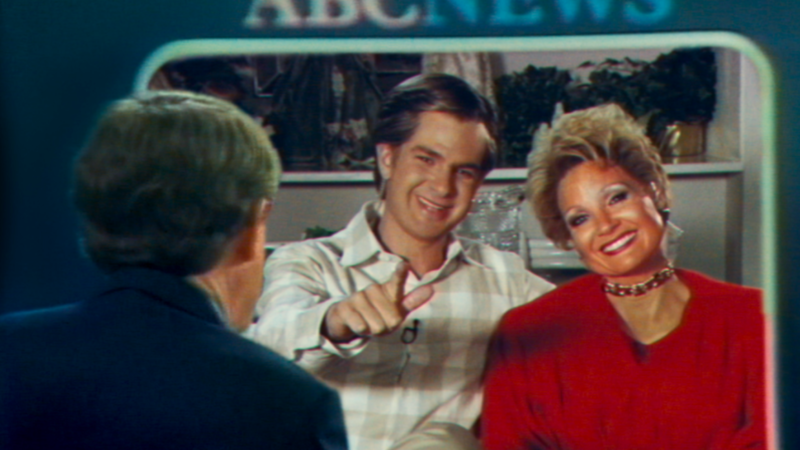Review: The Eyes of Tammy Faye
Jesus wept.

Gene Scott was my kind of televangelist. Whenever I was in LA in the 1980s I'd flick on his late-night talkfest (just him, talking) in whatever hotel room I happened to be staying and drink in his act—the carefully tended white hair, the fuming cigars, and the parade of eccentric hats (jaunty straw Panamas, jungle-ready pith helmets, salty captain's caps) that he wore while dunning his viewers for cash. Which was often, if not always. (Gene described the pledging of money to his ministry as "a worshipful act.") The man was shameless, and thus mesmerizing.
Scott wasn't a run-of-the-mill Pentecostal primitive (he had a Ph.D. of some sort from Stanford University). But as Werner Herzog demonstrated in God's Angry Man, his 1981 documentary about Gene, the pastor could thunder and howl with the best of his fiery tribe. His followers couldn't get enough of this, and even non-believers found him highly entertaining.
I don't doubt that Gene Scott loved the Lord, and I imagine the same could be said—although maybe more quietly—about his televisual contemporaries, the husband-and-wife gospel-floggers Jim and Tammy Faye Bakker, who rose to fame and (especially) fortune in the 1970s and '80s before being brought down to earth (and in Jim's case prison) by the tireless tax enforcers of the Internal Revenue Service.
Like Gene Scott, the Bakkers, too, were a fun watch—although for reasons of which the couple themselves might not have been entirely conscious. With Jim's blindingly toothy grin and Tammy Faye's bizarre, mascara-bomb eyes, the Bakkers were the sort of pitiful hicks who would likely be treated with jeers and condescension by most filmmakers. But Michael Showalter, the director of The Eyes of Tammy Faye, sees them in all of their flawed humanity. Basing his movie on a 2000 documentary by Fenton Bailey and Randy Barbato, and a script by Abe Sylvia, Showalter (The Big Sick) sketches in the backroads world of charismatic Christianity in the 1950s, and follows it through succeeding decades as it morphs into a very big business.
The director is fortunate—blessed, you might say—to have Jessica Chastain giving a sensational performance in the role of Tammy Faye, complete with all of the real woman's alarming makeup choices (the tattooed lip liner, the gold and aqua-blue eyeshadow) and her genuine devotion to the God of mercy and forgiveness. The actress is both emotionally and physically convincing at each stage of Tammy Faye's development—from the slim, sunny Bible college student who meets and then marries the borderline goofy Jim Bakker (Andrew Garfield, also fine) to the middle-aged woman at the end of the movie, her body thickened with age and her life crushed by the shame of her husband's downfall. Shining along with Chastain are Cherry Jones as Tammy Faye's disapproving mother and Vincent D'Onofrio as the scowlingly right-wing Moral Majority kingpin Jerry Falwell. (There's also an intriguing scene featuring Mark Wystrach, who plays the late record producer Gary Paxton, a man who moved from making novelty pop hits to gospel music, and at one point guided Tammy Faye's vocal performances in the Bakkers' home studio. "I haven't been this excited about working with an artist," he tells her, "since I produced 'Monster Mash.'")
As itinerant soldiers in the fundamentalist faith army, the Bakkers started out employing puppets to court the kiddie audience (leaving Tammy Faye with a chronic Betty Boop vocal squeak). Moving to North Carolina, they founded their own satellite television network, which before long was broadcasting their own talk show, The PTL Club. (The acronym naturally standing for Praise the Lord.) Fat with viewer donations (and $400,000 in self-awarded annual compensation), they built a $3-million headquarters and a huge Christian theme park. Tammy Faye floated plans to start staging Christian rock concerts ("something for the kids"), and scandalized Falwell and other big-time evangelists by promoting gay rights on the air and conducting a sympathetic interview with a Christian AIDS victim. ("I can't look at this," Falwell tells Jim Bakker.)
Then the roof fell in. It was reported that Jim had paid $279,000 in hush money to a secretary named Jessica Hahn after she charged that he had raped her. (Bakker admitted having sex with Hahn, but denied it was rape.) The IRS announced that the Bakkers owed $55 million in back taxes. And that was pretty much that. Jim Bakker, indicted for fraud, willingly took the fall on his own, leaving Tammy Faye to fend for herself; she eventually divorced him.
There's not a moment of glib ridicule in this movie. Chastain plays Tammy Faye Bakker as a woman of real faith, wronged not just by her worm of a husband but by stuffed-shirt preachers and tabloid culture at large. At the end of the film we see her alone in a big empty bed, praying. "God?" she says. "Where'd you go?"


Show Comments (30)